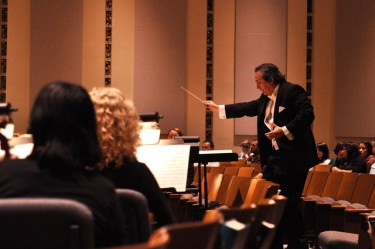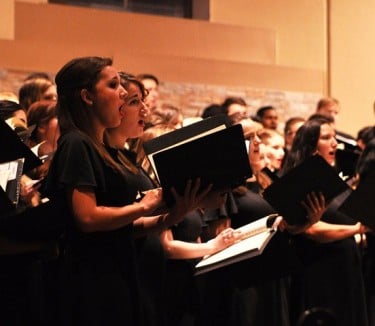Review by Janie Magruder
Photos by Alexis Bolze
GCU News Bureau
If the full breadth of your familiarity with Johannes Brahms is his tender lullaby, one of the most recognized tunes in the world today, you might be surprised at the range of his talents. On Tuesday evening, the Grand Canyon University Music Department demonstrated Brahms’ complex brilliance and musicality by performing “A German Requiem” at its spring choral concert.
The splendid, multilayered composition is anything but sleep-inducing.
Conducted by Dr. Juan Hernandez, assistant dean of the College of Fine Arts and Production, the 65-minute program featured stirring solo performances by GCU vocal instructors Dr. Sheila Corley (soprano) and Christopher Herrera (bass-baritone), who were accompanied by the Canyon Symphony Orchestra and the Canyon Choral Society.
It is said that Brahms first thought about composing a requiem after the death of his friend, mentor and fellow German composer Robert Schumann, in 1856. When Brahms’ mother died in 1865, he took it up seriously, and completed all seven movements of the grand work for chorus, orchestra and soloists by 1868 (the same year his lullaby was published, by the way).
After losing his mother, Brahms “couldn’t find the comfort he needed in the other requiems … so he took a number of texts from the Scriptures to speak on the life to come,” Hernandez said in introducing the piece to the audience at First Southern Baptist Church, adjacent to the GCU campus.
The forlorn sounds of cellos in the first movement, which opens with Matthew 5:4 (“Blessed are they that mourn: for they shall be comforted”) sets the tone for Brahms’ grief. The last movement, aptly from Revelation 14:13 (“Blessed are the dead which die in the Lord from henceforth. Sayeth the Spirit, that they may rest from their labours, and that their works follow after them”), conveys a peaceful resolution. You can almost imagine Brahms closing his eyes, finally able to rest.
In between, Corley was a superb soloist in the fifth movement, the text for which is based, in part, on Isaiah 66:13 (“Yea, I will comfort you as one whom his own mother comforteth”). Herrera’s powerful baritone led the chorus into the third movement, from Psalm 39:4-7, beginning, “Lord, make me to know the measure of my days on earth, to consider my frailty that I must perish.” He lent oomph to a powerful verse in the sixth movement, from 1 Corinthians 15 (“Lo, I unfold unto you a mystery. We shall not all sleep when He cometh, but we shall all be changed, in a moment, in a twinkling of an eye, at the sound of the trumpet”).
In addition to its stirring text, “A German Requiem” has soaring soprano notes, sweeping crescendos and moving decrescendos, numerous key changes and erratic variations in tempo. The chorus and orchestra handled them professionally and passionately, helping the appreciative audience feel despair, hope, tension, triumph, joy and peace.
You can’t ask for more than that in little more than an hour.
Contact Janie Magruder at 639.8018 or [email protected]










































